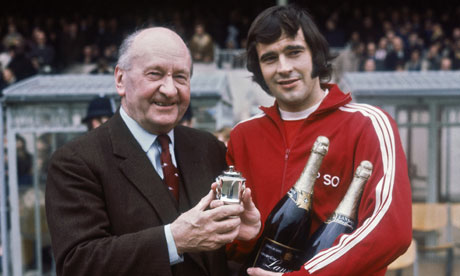
For those not familiar with the playing style of Peter Storey, a midfield fixture in the Arsenal side who won the Double in 1970-71, the best way to conjure him up is to picture the toughest, most uncompromising hatchet man of the present day; and then imagine him being decisively duffed-up by a relatively slight but undeniably ferocious figure in a stylish round-neck red-and-white shirt. Storey was one of those players: the Choppers and Nobbys and Bites Yer Legs who provided a convenient polarity with the headline gadfly act of their counterpart "mavericks", a double act that at times gives the impression that 1970s football was simply a combination of violence and dribbling.
Storey, as True Storey's subtitle, My life and crimes as a football hatchet man, suggests, is an interesting character in other ways. His life outside football involved divorce and roguery, a spell as landlord of a villainous London pub and a much-publicised arrest for smuggling pornography. Given that the challenge of every football autobiography is to make a play for an audience beyond club loyalties and special-interest fandom, these are promising materials.
And True Storey is a diverting read, albeit much of its humour is of the unintentional type. "Peter ... is a man at ease with life" we're told on the inside cover. The first page of the introduction has him growling: "I was slagged off unmercifully ... so much rubbish has been written about me, so many lies and half-truths peddled as 'fact'."
The first childhood fight comes on page 14 ("I dished out and suffered my fair share of bloody noses") and so, oddly thrilled, you wait for the action to kick off. Which it does eventually. After some nice detail about schoolboy football the teenage Storey is soon at his beloved Highbury signing professional forms. Suitably braced, we await the lurid tales. Storey buys a new overcoat. He moves into a bungalow with Terry Neill ("my abiding memory is going down the launderette for the first time"). Things pick up with our first proper onfield violence as Storey is head-butted by Jim Storrie of Leeds ("I reeled backwards, trying to stay on my feet") and, in truth, these are the best bits.
"I will never attempt to even begin to make excuses for what I did in football," Storey writes. But what did he do exactly? "The trick was to get in early as possible, hit them hard, give them a good wallop, make them feel as if they'd been in a car crash or hit a brick wall." This is full contact stuff and it would have been nice to have a few more specifics.
Some allegedly sensational detail follows about how Storey was nearly dropped for the 1971 FA Cup final ("It was as if I had spent ages making love to the most beautiful woman in the world only to be kicked out of bed five minutes before the climax," he says, a little unnecessarily). And before long we're into retirement and pub landlordship and encounters with Howard Marks and all the rest of it.
True Storey is an easy read and has a deal more charm and pep than most autobiographies by footballers of the era. Storey becomes more likable the more time you spend inside the book's covers, and this includes a final high‑speed litany of court appearances and tabloid splashes, where the bastard's bastard comes across as quietly penitent in what is, throughout, a compelling kind of mea culpa.

